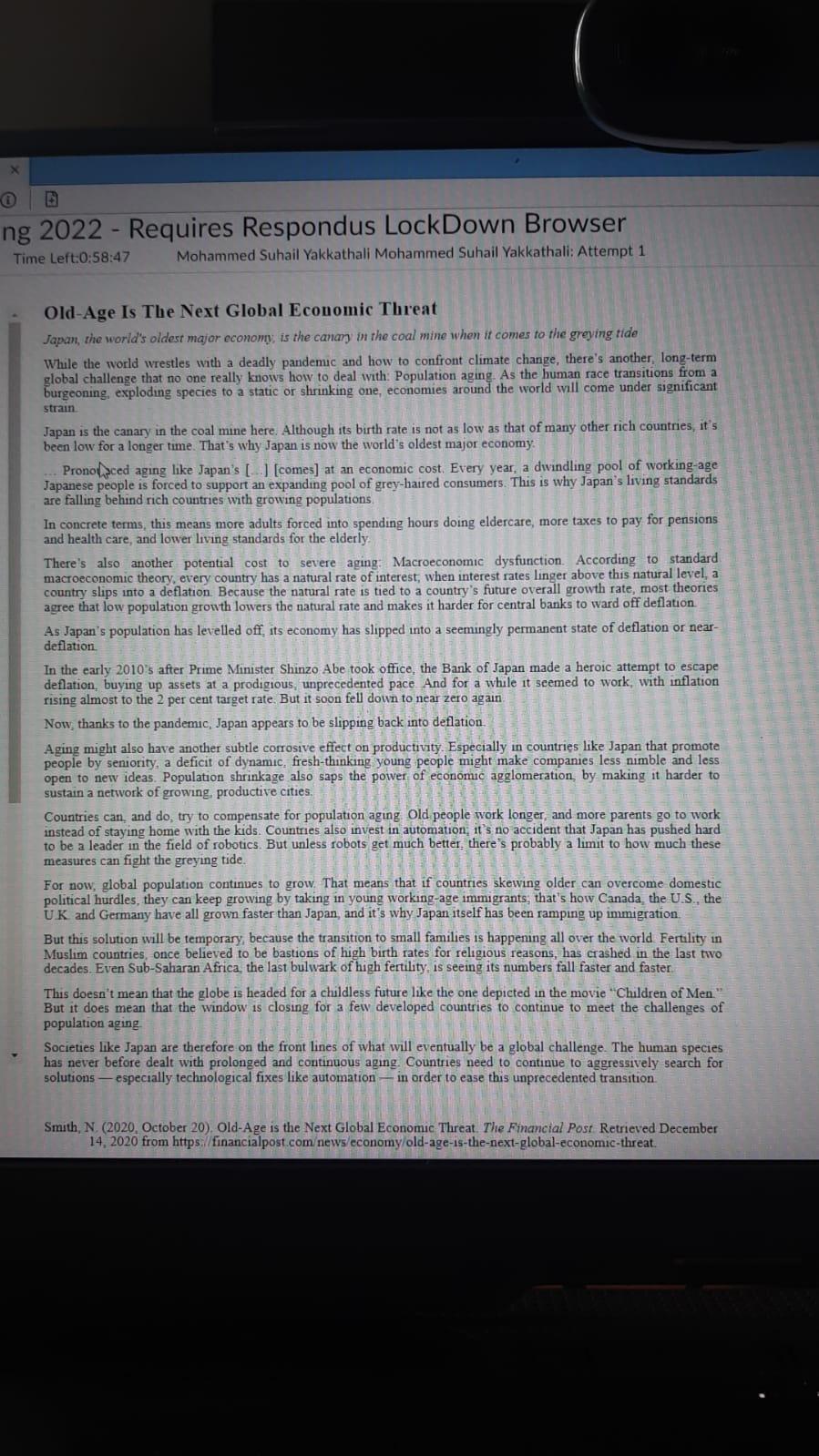Answered step by step
Verified Expert Solution
Question
1 Approved Answer
Discuss the main idea of this article along with support to your main idea. B ng 2022 - Requires Respondus LockDown Browser Time Left:0:58:47 Mohammed
Discuss the main idea of this article along with support to your main idea.

B ng 2022 - Requires Respondus LockDown Browser Time Left:0:58:47 Mohammed Suhail Yakkathali Mohammed Suhail Yakkathali: Attempt 1 Old-Age Is The Next Global Economic Threat Japan, the world's oldest major economy, is the canary in the coal mine when it comes to the greying tide While the world wrestles with a deadly pandemic and how to confront climate change, there's another, long-term global challenge that no one really knows how to deal with: Population aging. As the human race transitions from a burgeoning, exploding species to a static or shrinking one, economies around the world will come under significant strain Japan is the canary in the coal mine here. Although its birth rate is not as low as that of many other rich countries, it's been low for a longer time. That's why Japan is now the world's oldest major economy. Pronolaced aging like Japan's [...] [comes] at an economic cost. Every year, a dwindling pool of working-age Japanese people is forced to support an expanding pool of grey-haired consumers. This is why Japan's living standards are falling behind rich countries with growing populations. In concrete terms, this means more adults forced into spending hours doing eldercare, more taxes to pay for pensions and health care, and lower living standards for the elderly. There's also another potential cost to severe aging: Macroeconomic dysfunction. According to standard macroeconomic theory, every country has a natural rate of interest, when interest rates linger above this natural level, a country slips into a deflation. Because the natural rate is tied to a country's future overall growth rate, most theories agree that low population growth lowers the natural rate and makes it harder for central banks to ward off deflation As Japan's population has levelled off, its economy has slipped into a seemingly permanent state of deflation or near- deflation. In the early 2010's after Prime Minister Shinzo Abe took office, the Bank of Japan made a heroic attempt to escape deflation, buying up assets at a prodigious, unprecedented pace. And for a while it seemed to work, with inflation rising almost to the 2 per cent target rate. But it soon fell down to near zero again. Now, thanks to the pandemic, Japan appears to be slipping back into deflation. Aging might also have another subtle corrosive effect on productivity. Especially in countries like Japan that promote people by seniority, a deficit of dynamic, fresh-thinking young people might make companies less nimble and less. open to new ideas. Population shrinkage also saps the power of economic agglomeration, by making it harder to sustain a network of growing, productive cities. Countries can, and do, try to compensate for population aging Old people work longer, and more parents go to work instead of staying home with the kids. Countries also invest in automation, it's no accident that Japan has pushed hard to be a leader in the field of robotics. But unless robots get much better, there's probably a limit to how much these measures can fight the greying tide. For now, global population continues to grow. That means that if countries skewing older can overcome domestic political hurdles, they can keep growing by taking in young working-age immigrants; that's how Canada, the U.S., the UK and Germany have all grown faster than Japan, and it's why Japan itself has been ramping up immigration. But this solution will be temporary, because the transition to small families is happening all over the world Fertility in Muslim countries, once believed to be bastions of high birth rates for religious reasons, has crashed in the last two decades. Even Sub-Saharan Africa, the last bulwark of high fertility, is seeing its numbers fall faster and faster. This doesn't mean that the globe is headed for a childless future like the one depicted in the movie "Children of Men." But it does mean that the window is closing for a few developed countries to continue to meet the challenges of population aging. Societies like Japan are therefore on the front lines of what will eventually be a global challenge. The human species has never before dealt with prolonged and continuous aging Countries need to continue to aggressively search for solutions - especially technological fixes like automation in order to ease this unprecedented transition. Smith, N. (2020, October 20). Old-Age is the Next Global Economic Threat. The Financial Post Retrieved December 14, 2020 from https://financialpost.com/news/economy/old-age-is-the-next-global-economic-threat.
Step by Step Solution
There are 3 Steps involved in it
Step: 1
The main idea of the article is that population aging poses a significant and longterm global economic threat The focus is on Japan considered the wor...
Get Instant Access to Expert-Tailored Solutions
See step-by-step solutions with expert insights and AI powered tools for academic success
Step: 2

Step: 3

Ace Your Homework with AI
Get the answers you need in no time with our AI-driven, step-by-step assistance
Get Started


